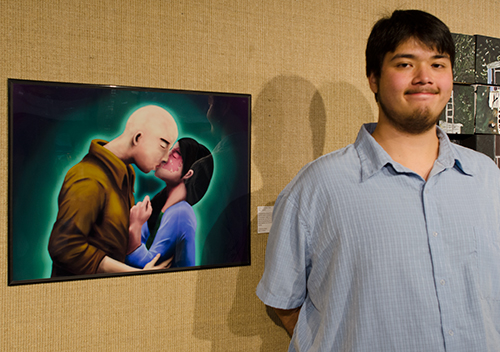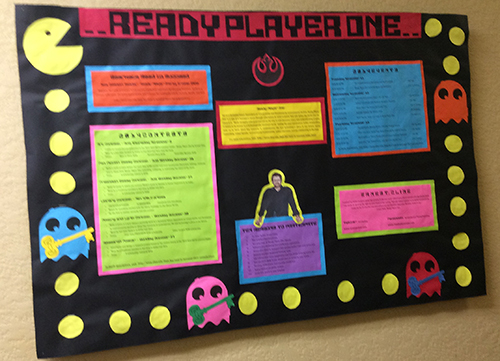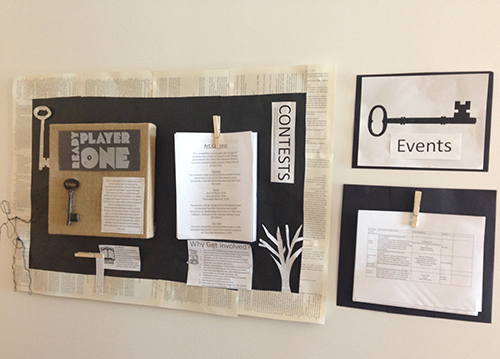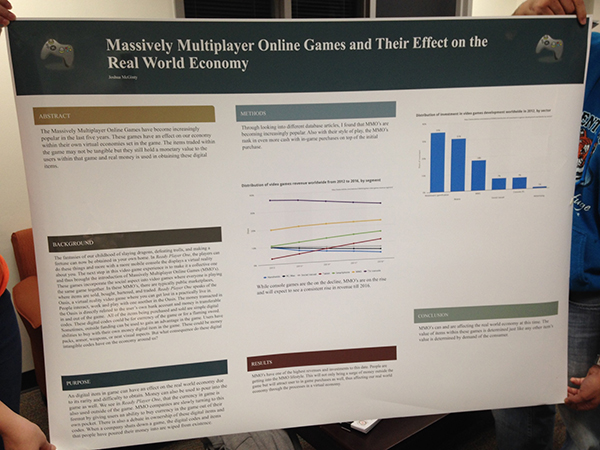'Ready Player One' Contest Winners Recognized
Nov. 14, 2014
SHSU Media Contact: Jennifer Gauntt
 |
| The winners of this year's "Ready Player One" Bearkats Read to Succeed contests were recognized during a luncheon on Thursday (Nov. 13), during this year's BRTS Author's Forum. Winners were treated to lunch and discussed the inspiration for their winning pieces, while presenting their work, as applicable. This years winners included (in a semi-circle, from tallest on left) Kristopher Croy, art; Nora Calderon, poetry; Steven Roman, art; Caleb Crosby, fan fiction; Tyler Josefsen-Lanham, poetry; Cody Davis, freshman essay; and Josh McGinty, research poster. To see or read their winning submissions, see below, or click on their names above. |
Freshman Essay Contest
The “Freshman Essay Contest,” sponsored by the New Student Orientation program, asked students to connect the book’s quest to themes or issues important to us today, using specific examples from the book to support an interpretation. The winner received a $500 scholarship.
Winner: Cody Davis, freshman economics major
"Ready Player One"
Civilization predicates technology, which in turn leads to progress, feeding back into the development of the originating civilization. What costs does technological advancement entail, however? History dispels the simple, additive formula listed above as unfettered, unproven idealism: for every beneficial aspect of a new idea, some determined malefactor will find its negative counterpart. Accordingly, an accurate analysis of technology’s impact must incorporate its dual nature. Ernest Cline capitalizes upon this binary form throughout his novel Ready Player One in order to weave a persuasive narrative around society’s technological alms and ailments, crafting the quest of his protagonist, Wade, in such a way as to demonstrate the reality and potential of innovation.
The foremost example of Cline’s subtle contrasting between actual and latent involves his treatment of the environment. In keeping with typical forecasts of destruction due to climate change, Cline depicts Wade’s world as a depleted husk burdened by human overpopulation. He thus draws inspiration from the real world, demonstrating the results of unrestrained, inefficient technology use. Yet the same tools which drained Earth of its vitality also serve to preserve the morale of the populace: as the environment continues to deteriorate, James Halliday invents the OASIS, seemingly perfect in every way that reality is not. The environment represents all that technology has done; OASIS stands for all that it could do, given the right cultural atmosphere. Society faces this choice every day, whether in the form of industrial machines converted to arms manufactories or employed to build medical supplies. Individuals choose between far less disparate options, yet the aggregation of each choice results in an opportunity cost which society as a whole must pay. Cline ensures that the reader understands how individuals still possess efficacy even in such an oppressive scenario: Wade, although making mistakes along the way, also makes the right choices, such as refusing IOI’s offer to become a “gunter-for-hire,” and helping his fellow gunters when appropriate instead of continuing his efforts alone. The implication, therefore, remains a strong emphasis on the custodial role individuals play in maintaining both Earth and society. All one has to do is make the right choices.
For all its powers as a world separate from reality, OASIS exists also as a machine of human invention, thus rendering it flawed. One need only examine Halliday’s fixation with the icons of his youth to realize that one man’s creation of a separate existence can enable new forms of nostalgia and escapism to run rampant. Here too we see parallels between Cline’s fiction and our daily lives, with video games and social media enabling the masses to forget about their problems. While not on the immersive scale of OASIS, inventions such as Google Glass seem to be heading in that general direction, and surely virtual reality will one day be a fact of our lives just as much as it is for Wade’s. For most of the novel, his quest embodies the entirety of his life; only when he encounters something more tangible than OASIS does he rouse from his obsession and pursue motives more noble than the personal gain which began his journey. Art3mis’ generosity, and his feelings for her, prove to him that reality surpasses its virtual twin. Instead of usurping real life, however, what would happen if OASIS could be used to augment it? The beginnings of this thought experiment can be seen in the planet Ludus, which houses all of the schools in OASIS. Accessibility of education and information shapes much of the modern world and our perception of it: if all humans were given access to knowledge, how many of the world’s problems might be solved. Furthermore, a program such as OASIS could be used to explore our own reality to its deepest depths and outermost expanses. Scientists have trouble grasping certain fundamental concepts due to the infinitesimally small nature of molecules and particles; the OASIS could allow students of science to explore their fields as never before. The same could be said of economics, or any other social science; virtual intelligence and reality could be combined to run scenarios which could provide new insights into human behavior, from that of the individual to entire markets. The problem, as always, remains ensuring that newfound information enhances the human condition as opposed to being used against it.
With the OASIS’ ability to encompass the globe comes a unique control over the lives of any who access it being placed in the hands of its executor. For Wade, a central part of his quest revolves around keeping IOI from gaining stewardship of OASIS, as they would certainly abuse the program. In this, Cline keeps his story from teetering over into Orwellian dystopia: IOI’s crimes are heinous, but as they fail in their efforts to claim the Easter egg, they never “enslave” OASIS. Instead, Wade triumphs over his corporate enemy, declaring that OASIS will always be available to the populace. Such an imperatives possesses interesting ramifications. In the novel, many people use OASIS to participate politically within their nation. Yet they also interact with the citizens of every other nation, and from this cultural diffusion emerges a new variety of civic nationalism which transcends even the globalization of the real world. OASIS users form a community based on a shared intellectual heritage, and if that community could be turned toward improving the outer world, their ability to do so would transcend even that of institutions such as the United Nations. For better or for worse, oligarchs and private interests could no longer meddle in public affairs if each citizen were able to interact with one another and the world as easily as they do in the OASIS. Cline thus asks the reader to consider a world in which every individual were allowed the same efficacy in their political choices, again empowering the individual despite the negative connotations of virtual reality. Whether or not our society engages in that trajectory remains to be seen, but considering the societal upheavals of the Arab Spring, all arranged through social media, perhaps it is possible.
Equal access to knowledge, to the world, to power; technology promises these things even as darker effects surface. Cline’s argument through Wade’s trials and tribulations frames itself as neither overly optimistic nor unnecessarily dour: the individual decides how best to use what he or she possesses, including technology. It is simply a matter of putting others before oneself and reality beyond virtual, shallow pleasures.
Art Contest
The “Art Contest,” sponsored by the Lowman Student Center, asked students to explore themes of the novel creatively, through an art form, offering $500 in scholarships to three winners. Not pictured below is second place winner Sergio Gallegos.
 |
"Beacon"$250 Kristopher CroySenior computer animation major |
 |
"Falling Apart"$100 honorable mention scholarship winner: Steven RomanJunior art and graphic design major
|
Poetry/Lyric Contest
The “Poetry and Lyric Contest,” sponsored by the Professional and Academic Center for Excellence, offered $500 in scholarships to students who created verses on either a surviving spirit in a dystopian future dependent on virtual reality and threatened by environmental decline, or on key concerns in contemporary life and technology’s place in our future.
$250 scholarship winner:
Brent Eaton, freshman business administration major
"The Electronic Abyss"
An endless lonely landscape sprawls into the distance
Barren and void, yet filled with the hollow shells
Casings, of what was once a flurry of life and interaction
Dreadful stillness now descends upon what was once life
At the zenith of our technological age, what were once communities are just ones
and zeros
$125 scholarship honorable mention winner:
Nora Calderon, freshman public health major
"Which One?"
Which version of me is the real one?
Is it the one where I slay a dragon and save a village?
Or is it the one where I slay a rat in my kitchen?
It the one where I sleep on silk sheets in a crystal castle?
Or is it the one where I sleep in dirty sheets on a stained mattress?
Is it the one where I can leap over mountains
and have wings to touch the glowing sky?
Or is it the one where I can leap over a puddle in the rain?
Is it the one where I'm celebrated by all with friends aplenty?
Or is it the one where my only friend is my cat?
Is it the one where I accomplish countless quests?
Or is it the one where I accomplish the chores?
Which one?
Which version of me is the real one?
Is it the one where I'm happy with a smile as bright as the sun?
Or is it the one where I sink into the deepest pit of despair?
Is it the one where I want to live?
Or is it the one where I want to die?
$125 scholarship honorable mention winner:
Tyler Josefsen-Lanham, freshman mass communication major
"Utopia"
Since I was young I always wondered
Why do I see the world differently?
But as I grow older I simply have pondered
Why people don’t see the world the same as me?
When you see The Stacks you see a mess,
While I envision books atop a desk.
When you think Oasis you think water;
I think of schooling for my son and my daughter
The world has changed from what it was
And my perception also does,
For what used to be is now no longer
And those who only see Dystopia grow no stronger.
An escape from reality
Is an escape from torment,
And is the best survival
Even just for a moment.
A way to leave it all behind
A way to change the picture in my mind
Of what life could be and what life should be
But instead life itself became the enemy
How could we have sat around
While the world burns itself to the ground?
How could we just stand and gaze
While all we’ve worked for is set ablaze?
People say we are surrounded
By Dystopia…
But close your eyes… open your mind…
Can you not see the real Utopia?
Freshman Research Poster Contest
The “Research Poster” contest, sponsored by the Elliott T. Bowers Honors College, provided a $500 scholarship to an incoming freshman who investigated a theme from the novel and presented that research in poster form.
Winner: Josh McGinty, freshman accounting major: "Massively Multiplayer Online Games and Their Effect on the Real World Economy"
Fan-Fiction Contest
The $250 scholarship was sponsored by the English department and asked students to create a short story based on characters or themes in the book, as a means of extending, critiquing or redirecting the vision of the novel. Crosby said his short story takes place after the events of the book, wherein a Caleko (his avatar) is a delivery man in the Oasis. Like Cline, Crosby used influential books, games and movies from his childhood in shaping the events that unfold in his fan fiction.
Winner: Caleb Crosby, freshman mass communication major
"Caleko"
It’s been almost three months; three months since the Battle of Castle Anorak, three months since the end of the hunt, and three months since Parzival became the leader of the OASIS and of GSS. So much has changed in that time, both inside and outside of the OASIS. For one, no one has to worry about IOI or the Sixers anymore. The company was effectively shut down after Sorrento was found guilty of several accounts of murders. He himself was banned from ever accessing the OASIS and stripped of his title. A bunch of other Sixers had their accounts erased by Parzival personally once IOI was uprooted. All the indents at IOI were relieved, and GSS bought out just about everything their rival had owned. Anything else was either bought privately or made a public asset. Things were getting much better, for everyone.
This Parzival guy was filling the role that Halliday had left perfectly. When Parzival started restoring OASIS to pre-Hunt glory, I felt left out. I had lost my avatar account, Caleko, when the Sixers activated the Catalyst at Castle Anorak. But my despair was short lived, because Parzival revived almost every OASIS avatar that died (except for the Sixers of course). I’m telling you, this guy rocked. He didn’t even spend that much time in the OASIS anymore, but what he did outside of it was totally worth it. Aside from buying out IOI, he and the other avatars of the High Five helped to restore and rebuild a bunch of cities, create large farms, and even protect what was left of national parks. And now that life on Earth was getting better, I felt much better whenever I was in the OASIS. I knew I didn’t have to worry about the power going out in my apartment, meals were a lot easier to come by, and my job was once again stable.
What exactly was my job? As I said before, my avatar’s name was Caleko (a twist on the feline color scheme calico, and a homage the biotech company of the same name). My real name is Caleb, but like any sane OASIS user I kept my anonymity. The OASIS may have been better, but it was still by no means a safe place. Anyway, as Caleko I ran a small courier business. I’d transport supplies, weapons, documents, and pretty much anything else someone needed to be delivered. I’d even delivered a few things for Parzival back when the Hunt was still on. It was a good job, paid well, and I enjoyed it. But I enjoyed being a gunter even more. I was by no means the best; I hadn’t even found the second gate when Parzival won. I had fun though. A lot of gunters I knew were so serious, especially once Parzival and the others started getting somewhere. It didn’t matter now anyway, ‘cause Parzival won of course. But I still hunted around for other, less important Easter Eggs. I was actually able to finish The Hunt even after Parzival finished it, because he left it open for other avatars to complete for fun.
My favorite world to go to was Phantasma, one of many worlds with a mish-mash of hundreds of fantasy worlds, from Narnia and Middle Earth to Tamriel and Azeroth. You could literally fight Smaug and Alduin at the same time, and then take a ship to King’s Landing. I’m telling you, this place rocked. I made Caleko’s HQ on an OASIS original world that was made specifically for avatar residence. It wasn’t far from Phantasma, and that’s why I chose it. I lived on an island in a recreation of Jorvaskr from Skyrim. It came free with the fantasy builder template pack, but I had put my own touches on it. Instead of the Underforge, I had put in the Nolanverse Batcave. Instead of Alfred or Tilma the Haggard as my assistant, I had Cortana from Halo. My armada of vehicles was made up of a Black Pearl I had modified to operate like the ships from Treasure Planet, the Millennium Falcon, a Boeing Chinook, and various other smaller vehicles (some fictional, some not). I also had one of those big shuttle things from Avatar for big transports. And finally, my armory was probably my proudest bit of property. It wasn’t big by any means, but it was enough for me. I had a few things I had bought on my own, but most of my gear was things I collected on my escapades. I rarely got rid of anything, because I could either sell it off later or use it myself. I called my place Isla de Nerda.
Click here to continue reading.
Residence Life RA Bulletin Board Contest
Each winner received a $100 Barnes & Noble gift card, courtesy of Residence Life. The contest asked the resident advisers to create an informative bulletin board for his/her respective residence hall that drew upon themes in the novel, while also informing his/her residents about activities related to the Bearkats Read to Succeed selection.
Edna BarreraEstill Hall |
 |
Caitlin BentleyRaven Village |
 |
Nohemi RodriguezLone Star Hall |
 |
- END -
This page maintained by SHSU's Communications Office
Associate Director: Julia May
Manager: Jennifer Gauntt
Located in the 115 Administration Building
Telephone: 936.294.1836; Fax: 936.294.1834
Please send comments, corrections, news tips to Today@Sam.edu.

 SamWeb
SamWeb My Sam
My Sam E-mail
E-mail


